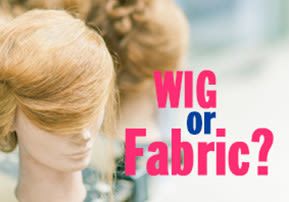
Wig or Fabric Hair Covering?
A new BT asks why so many rabbis prefer women to cover their hair with "a piece of fabric" rather than with an attractive wig. Racheli answers this super-sensitive question...

Dear Racheli,
I am pretty new in my teshuva process, and I’m having a hard time understanding why so many Rabbis say it’s better to cover my hair with a piece of fabric than with a nice wig. I recently bought a beautiful wig, and I feel that it’s making my observance easier. Furthermore, most cloth hair coverings are unattractive. I don’t think I can do it, and I honestly don’t see why it’s necessary. After all, isn’t the important part that my hair is covered? Thanks for your help…
Dalia
Oh, boy, Dalia- you just went and opened up a giant can o’ worms. This is probably the most sensitive and controversial subject in modesty, and maybe even in all of Judaism! I have a feeling I’m going to get in major trouble for this, but that never stopped me before!
Let’s start with an obvious observation. First, you need to decide for yourself if your wig is modest or sexy. For example, I used to wear a wig that made me look like a movie star. It was luxurious, long, and had  beautiful bouncy curls when it was all done up.
beautiful bouncy curls when it was all done up.
To be honest, the mitzvah of covering my hair ended up being the last thing on my mind when I put on my wig. What was most important was that it made me look good. I certainly didn’t want to suffer because I was doing a mitzvah!
Tell me, do you think that was modest? Is it modest to walk down the street knowing that you will turn heads because your hair makes you look so gorgeous?
Let’s face it- everyone knows that a nice wig is by far more beautiful than most women’s real hair. So how in the world is that modest? Maybe the woman is better off not covering her hair at all, some would say.
There are die-hard wig fans that will defend this practice until the end. They will point out the very misunderstood and abused permission that the Lubavitcher Rebbe gave for women to wear wigs, for example. Many wigs these days even come with personal haskamot, stamps of approval from big Rabbis. I guess that makes them extra-kosher!
Here is something else for you to think about. Covering your hair is probably the most important mitzvah you can do, aside from the three mitzvot that are required of women: family purity, separating challah, and lighting Shabbat candles. There are plenty of spiritual benefits to covering your hair that I have no idea about, but I do know that it changes the aura of a woman. Rabbi Zamir Cohen proves it with a before and after picture in his incredible book, The Coming Revolution. FYI- this book is perfect for people who are looking for scientific proof to some of the Torah’s commandments and confusing issues such as reincarnation.
The fact that it’s such an important mitzvah is proven by the incredible amount of resistance and misinformation that surround it. To me, it’s as if the Other Side is using every angle to make women not want to cover their hair the proper way.
Here is a true story that Rav Lazer Brody’s wife recently told me. There was once a young woman who came to visit HaRav Mordechai Sharabi zatza”l, who was one of the leading Kabbalists and Rabbis of our time. She begged him for a blessing for children, as she was unable to conceive, “Rabbi, please bless me with children! I have tried for several years with no luck.”
He looked at her silently for a moment, contemplating her request. “I will bless you, but on one condition. You must commit to wearing a tichel (scarf hair covering) instead of your wig.”
“But, Rabbi, there is no way I can walk around with a tichel! No one in my town wears one, and I will feel so ugly with it!” she protested.
“Do you want my blessing or not?” he replied.
“Yes,” she responded reluctantly. He gave her the blessing and she left. When she got back home, her friends couldn’t believe what she had agreed to. She felt terrible, being the only one walking around with a simple tichel while her friends wore their long glamorous wigs. However, HaRav Sharabi’s blessing bore fruit, as she indeed gave birth to a baby girl that same year.
Over the next six years, she enjoyed her one and only beautiful daughter tremendously. However, she still struggled immensely with the tichel, and her friends didn’t make things easier. In fact, they did their best to get her to get rid of the ugly tichel and be like one of them- frum and sexy. What an oxymoron!
After six years, she finally gave in. She threw away the tichel and happily put on her wig. She felt as if she had come back to life. All of a sudden, she had a renewed vibrancy and happiness in her daily activities that she had forgotten. Even her marriage had a renewed spark. She felt like she had been re-instated into her rightful social standing.
A short while later, her daughter suffered a terrible accident and died.
She made her way back to HaRav Sharabi’s office, tearfully relaying to him what happened, and begged him for another blessing.
He stared at her for a few moments before responding: “Do you think this is a joke?”
Her heart almost stopped.
He continued: “Do you know what I had to do to get you that child? I had to bend the rules of nature for you! And now you want me to do it again? I have nothing left to give you.”
She left, heartbroken, and completely devastated.
Dalia, this mitzvah is so difficult because of the great rewards that are waiting to come down to not only us, but to our children as well. As with any mitzvah, we cannot see the spiritual effects of what we are doing. All we can do is believe that we are accomplishing something great. But it’s even more than that.
When we do a mitzvah that is difficult for us, we show Hashem that we are putting our own selfish desires aside so that we can do what He desires for us. Not only does this give our Creator the greatest pleasure, but we get rewards that are far greater than our efforts.
I personally still have a hard time with the tichel, as I also used to have a few beautiful wigs. But, I look at my happy, healthy children and the wonderful life that Hashem gives me every day, and I think, “Covering my hair is such a small price to pay for the millions of blessings Hashem gives me every single day.”
May Hashem give you the strength to do what’s right, and may you see countless blessings from your efforts.
All the best, Racheli








10/17/2017
A little scared
Very nice articale but that story kind of scared me I’m not that frum I don’t cover my hair daily but I do cover on Shabbat and holidays now I feel guilty and I’m terrified that I’m not covering my hair but I don’t want to take something upon myself out of fear but out of love and besides it won’t look right covering my hair daily and walking around with jeans
10/17/2017
Very nice articale but that story kind of scared me I’m not that frum I don’t cover my hair daily but I do cover on Shabbat and holidays now I feel guilty and I’m terrified that I’m not covering my hair but I don’t want to take something upon myself out of fear but out of love and besides it won’t look right covering my hair daily and walking around with jeans
1/28/2017
Tichels are beautiful
Very good article! I watched a video last year talking about aura and what affects it. Reading Tehillim creates a high aura, wearing a wig brings negative aura, wearing a tichel creates a high aura, etc. it was amazing. I'm not sure where you are looking to buy tichels, though, cause all the ones I ever see, and wear, are beautiful! There are so many ways to wrap them & dress them up with pins, and stuff. I love wearing them, even though I stand out where I live.